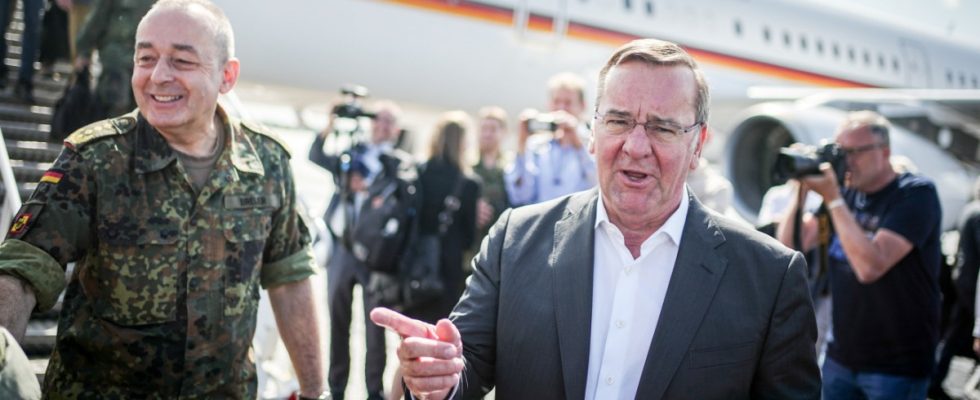After concerns about an increased threat on NATO’s eastern flank due to political instability in Russia, Germany wants to send around 4,000 additional Bundeswehr soldiers to Lithuania on a permanent basis. “Germany is ready to permanently station a robust brigade in Lithuania,” said Defense Minister Boris Pistorius on Monday during a visit to the Lithuanian capital, Vilnius. The prerequisite is the creation of the necessary infrastructure to accommodate the soldiers and exercise facilities.
On Sunday, after the uprising of the Russian private army Wagner against the leadership in Moscow, Lithuanian President Gitanas Nauseda called for a further strengthening of NATO’s eastern flank. It is unclear what role Wagner boss Yevgeny Prigozhin could play in exile in Belarus, so the security of the eastern border must be increased, said the head of state of the EU and NATO country. “I’m not just talking about Lithuania here, but about NATO as a whole,” said Nauseda. Lithuania borders Belarus and the Russian Baltic Sea exclave of Kaliningrad.
“We are dealing with a large state, a nuclear state, and any internal unrest inevitably has consequences for the security of the surrounding states,” Nauseda said, referring to Russia. So far he has no information that confirms that the Wagner boss is already in Belarus. He announced that in the future Lithuania would use more intelligence capabilities to assess the political and security aspects of the situation in Belarus.
Pistorius’ announcement means a U-turn. So far, the Chancellery and Defense Ministry have taken the view that it is sufficient to have a brigade in Germany that can be deployed in Lithuania in an emergency. Since then, Germany has only stationed the brigade’s command post permanently in Rukla, Lithuania. This includes about 60 people.
That was not enough for the Lithuanian side from the start. She refers to a promise made by Chancellor Olaf Scholz (SPD) last summer: At the time, Scholz had promised to set up such a combat unit with 5,000 women and men in addition to protecting Lithuania. Scholz was reacting to the Russian attack in Ukraine. Since then, both sides have been at odds over how the announcement should be understood.
So far, Germany does not have a complete brigade for this task
During a visit to Lithuania in March, Pistorius declared that his people “had the skills” to ensure presence and protection in Lithuania. When it came to the brigade’s location, it was less a question of “what Germany is up to” and more about what NATO considered right and necessary, he said at the time. According to Pistorius, the question arises as to what makes more sense militarily: a permanently stationed brigade in Lithuania or “remaining flexible” along the eastern flank and showing a regular presence. His reluctance also had to do with the fact that Germany itself does not yet have a complete German brigade that would be able to carry out a combat mission over several weeks immediately and without a long preparation period.
Now Germany is giving in to Lithuania’s urging. The change of course also comes as a surprise to the troops. Just last week, a high-ranking representative of the Bundeswehr said in a confidential meeting that permanent stationing was currently out of the question. On the one hand, Lithuania does not yet have the infrastructure in terms of accommodation and military training area capacity for 4,000 soldiers. On the other hand, the Bundeswehr is not at all familiar with permanently stationing soldiers and their families in another country. There is also a lack of personnel for such a step, especially among the non-commissioned officers.
In addition to Pistorius, NATO Secretary General Jens Stoltenberg also traveled to Lithuania, where a major exercise is currently taking place. In the past few days, around 300 tanks and other vehicles have been transferred to Lithuania in addition to 1,000 soldiers for the maneuvers scheduled for July 7. The next NATO summit will then take place in the capital, Vilnius, on July 11 and 12.
A finding of the past weekend: Putin can be forced to compromise
Germany has already agreed to this with previously stationed in Slovakia patriot-To want to protect anti-aircraft systems. German government circles also see that Russian President Vladimir Putin allows himself to be forced into compromises under great pressure. After he had branded Wagner boss Prigozhin as a traitor and threatened severe punishment for his advance towards Moscow, he was allowed to travel to Belarus with impunity after he had ordered his troops back. However, he has not appeared since Saturday and his whereabouts are unknown.
It is now being considered whether even more extensive arms support for Ukraine could also force Putin to make concessions or an end to the Ukraine war. It is expected that Chancellor Olaf Scholz could also announce new aid at the NATO summit, but Germany has not yet wanted to participate in a fighter jet coalition with its own aircraft.
Deputy FDP parliamentary group leader Alexander Graf Lambsdorff called the permanent stationing of a Bundeswehr brigade “a strong signal that Germany is serious about defending NATO’s eastern flank.” With the transition from the previous battle group to a fully-fledged brigade, the traffic light coalition reaffirmed its security policy and military commitment in the alliance shortly before the NATO summit in Vilnius. This is “a guarantee of our freedom and security”. Such an extensive stationing of such a large number of soldiers on the territory of an ally had never happened before, stressed Graf-Lambsdorff, who is soon to move to Moscow as the new German ambassador.

